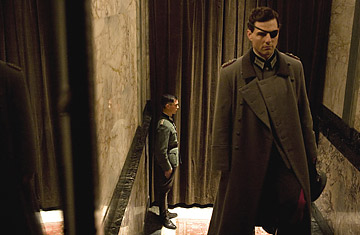
Common sense tells us — or ought to tell us — not to believe the pre-release gossip that accretes around expensive, commercially chancy movies starring actors who have found themselves on the tabloid hit lists.
Case in point: Valkyrie. It is the true story of the June 1944 plot to assassinate Hitler, which is largely unknown to today's popular audience, and which involves a lot of high-ranking German officers standing around in their smart uniforms, discussing their plans. In recent years the only movies about World War II that seem to gain any traction with moviegoers involve the Holocaust, which is morally fine, but which also greatly limits our understanding of the vastest and most desperate megadrama of the twentieth century. The other apparent problem with the film is that it stars Tom Cruise, whose sudden fall from favor can be dated from the moment he chose to hop up and down on Oprah's couch in a manner judged to be unseemly by the junk press, whose own seemliness is, as I understand it, always beyond reproach.
All of this, however, reckons without the suspenseful polish of the actual film, directed by Bryan Singer, he of The Usual Suspects and Superman Returns. I'm not going to argue that Valkyrie is a great movie. But in its way it is a thoughtful and entertaining one, especially in comparison with the pomp and pretentiousness of most of the competition this holiday season. And that says nothing of the measured passion and intelligence Cruise brings to his portrayal of Claus von Stauffenberg, the lead conspirator in the plot to place a bomb in close proximity to the Führer at a staff meeting at Wolf's Lair, his closely guarded, semisecret headquarters in East Prussia.
Stauffenberg is not a natural fit for Cruise, even though the actor's range and expertise have been consistently underrated, probably because most critics can't see beyond his extraordinary good looks. Here he is called upon to play the scion of one of German's oldest aristocratic families, a devout Roman Catholic and a brave, stiff-backed solider who served on virtually every front during the war and lost an arm and an eye in North Africa, yet continued his career as a staff officer. What turned him against the Nazis was not genocide — the Holocaust is not mentioned in this film — but the brutality he witnessed at the front, particularly as practiced by SS troops in Russia. These depredations, he felt, dishonored the German military tradition, an opinion in which he was not alone. Many Prussian officers (played in the movie by a raft of English actors including Kenneth Branagh, Bill Nighy and Terence Stamp) shared it. And so Stauffenberg attempted twice to bomb Hitler. The first try was totally aborted; the second might well have succeeded: he managed to arm and place a briefcase containing a bomb at Hitler's feet. But he left the room and another officer moved the briefcase in order to peer more closely at a map. As a result Hitler suffered only a mild wound. By the time Stuaffenberg had flown back to Berlin, where he intended to command an insurrection by the city's home guard, his role and that of his colleagues was beginning to be exposed. By the end of the day he and others were shot by firing squads, his last words being, "Long live our sacred Germany."
Obviously, this is a fated story, its end known to anyone with even a cursory knowledge of wartime history. But Singer has shot his film in a formal, almost elegant, style — it looks and feels like a lot of old wartime movies set in tortured Europe — and working from a script by Christopher McQuarre and Nathan Alexander, he does a very good job of maintaining suspense, mainly by concentrating on details, in particular the psychologies of all the conspirators. There's a degree of reluctance in some of them, and a degree of incompetence, too, but they exhibit a heartening bravery and dutifulness. Somehow, against the odds, we are drawn to them. Cruise does not quite look his part and I would guess the historic Stauffenberg carried himself with more aristocratic stiffness than he chooses to display. That said, he provides what any movie of this kind requires — someone to root for.
I suppose it's possible that the younger movie audience will regard Valkyrie as an irrelevancy, too distant in time, place and attitudes to attract their attention. But setting demographic prejudice aside, it is a well-made film that raises timeless questions about the demands of military duty when they are placed in conflict with higher principles. Have we not, in recent years, seen American soldiers wrestling — in less melodramatic form — with that issue?